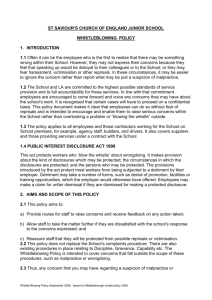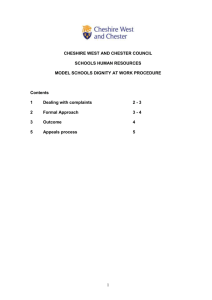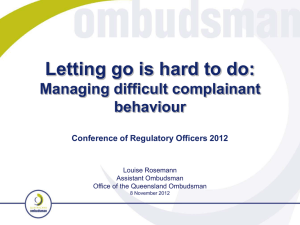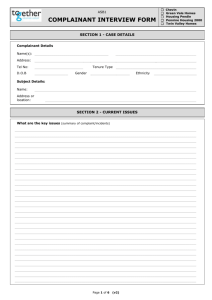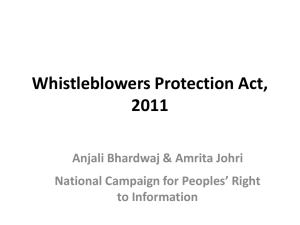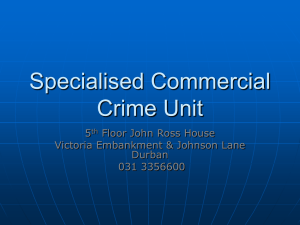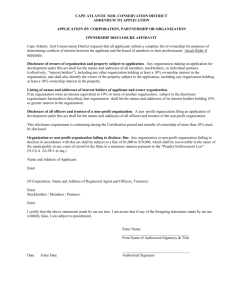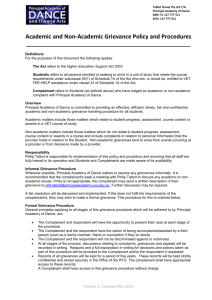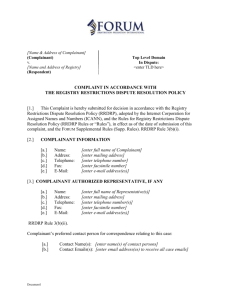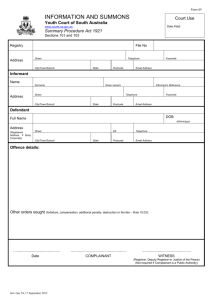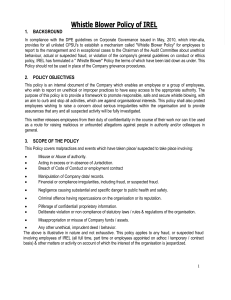8. Inappropriate Disclosure.
advertisement
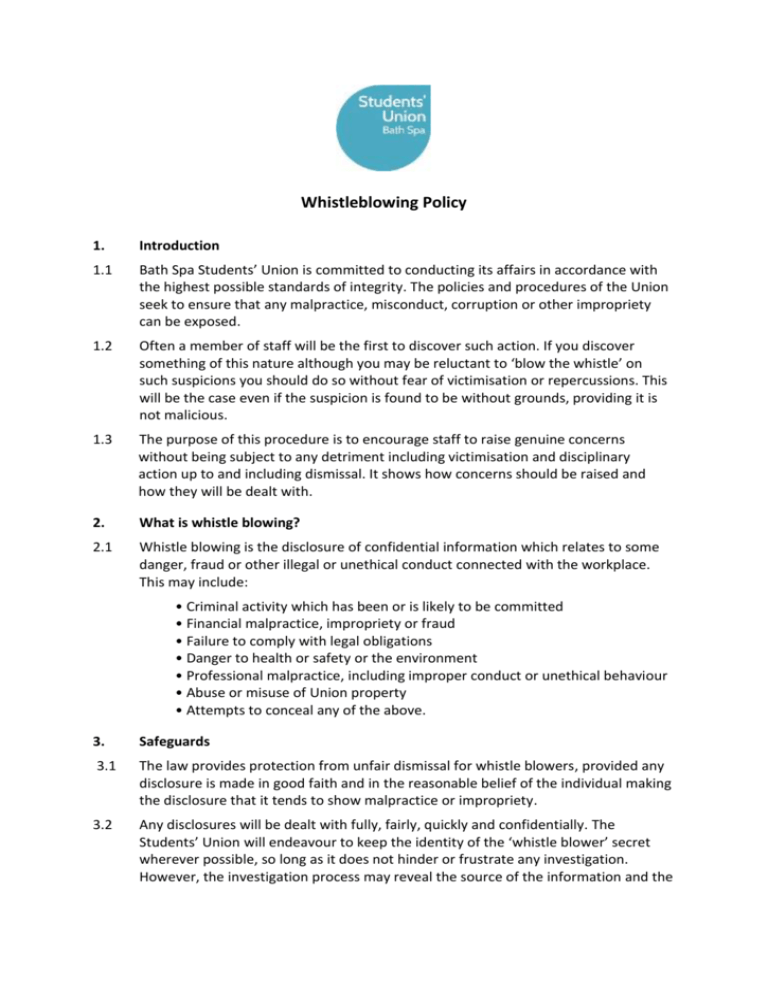
Whistleblowing Policy 1. Introduction 1.1 Bath Spa Students’ Union is committed to conducting its affairs in accordance with the highest possible standards of integrity. The policies and procedures of the Union seek to ensure that any malpractice, misconduct, corruption or other impropriety can be exposed. 1.2 Often a member of staff will be the first to discover such action. If you discover something of this nature although you may be reluctant to ‘blow the whistle’ on such suspicions you should do so without fear of victimisation or repercussions. This will be the case even if the suspicion is found to be without grounds, providing it is not malicious. 1.3 The purpose of this procedure is to encourage staff to raise genuine concerns without being subject to any detriment including victimisation and disciplinary action up to and including dismissal. It shows how concerns should be raised and how they will be dealt with. 2. What is whistle blowing? 2.1 Whistle blowing is the disclosure of confidential information which relates to some danger, fraud or other illegal or unethical conduct connected with the workplace. This may include: • Criminal activity which has been or is likely to be committed • Financial malpractice, impropriety or fraud • Failure to comply with legal obligations • Danger to health or safety or the environment • Professional malpractice, including improper conduct or unethical behaviour • Abuse or misuse of Union property • Attempts to conceal any of the above. 3. Safeguards 3.1 The law provides protection from unfair dismissal for whistle blowers, provided any disclosure is made in good faith and in the reasonable belief of the individual making the disclosure that it tends to show malpractice or impropriety. 3.2 Any disclosures will be dealt with fully, fairly, quickly and confidentially. The Students’ Union will endeavour to keep the identity of the ‘whistle blower’ secret wherever possible, so long as it does not hinder or frustrate any investigation. However, the investigation process may reveal the source of the information and the individual making the disclosure may need to provide a statement as part of the evidence required. 3.3 Anonymous Allegations Whistle blowers are encouraged to put their name to any disclosures they make. Concerns expressed anonymously are much less credible, but they may be considered at the discretion of the Union. In exercising this discretion, the factors to be taken into account will include: 3.4 The seriousness of the issues raised The credibility of the concern The likelihood of confirming the allegation from attributable sources Untrue Allegations If an individual makes an allegation in good faith, which is not confirmed by subsequent investigation, no action will be taken against that individual. In making a disclosure the individual should exercise due care to ensure the accuracy of the information. If, however, an individual makes malicious or vexatious allegations, disciplinary action may be taken against that individual. 4.0 How to make a Disclosure 4.1 Any employee concerned about malpractice within the Union should put their concern in writing to the Chief Executive. If the issue concerns the Chief Executive, the complainant should write to the Chair of the Board of Trustees. 4.2 Should none of the above routes be suitable or acceptable to the complainant, then the complainant may approach one of the following individuals: Chair of the Audit & Risk Committee Executive Officer to the Vice Chancellor (who, under the Union’s Complaints procedure is the University Board of Governors’ appointed independent arbiter.) 4.3 The Chief Executive (or Chair of Trustees or designated individual appointed under 4.2) will acknowledge receipt of your disclosure. The relevant party will investigate the disclosure and decide upon the appropriate course of action. This may require the appointment of an investigating officer. 5. Investigation Procedure 5.1 The Chief Executive Officer or Investigating Officer should meet with the complainant as soon as possible to obtain full details of the complaint. 5.2 A judgement concerning the complaint and validity of the complaint will be made by the Chief executive (or investigating officer). This judgement will be detailed in a written report containing the findings of the investigations and reasons for the judgement. The report will be passed to the Chief Executive or Chair of Trustees as appropriate. The Chief Executive / Chair of Trustees will decide what action to take as detailed below. 5.3 Where any complaint or investigation uncovers alleged malpractice by a member of Union staff, the Union’s Disciplinary Policy will be invoked. 5.4 If there is evidence of potential criminal activity then the Chief Executive (or Investigating officer) must inform the police. The Union will ensure that any internal investigation does not hinder a formal police investigation. 5.5 The Chief Executive (or Investigating officer) should also consider the involvement of the Union Auditors where financial or procedural irregularities are alleged. 5.6 The investigating officer should inform the member of staff against whom the complaint is made as soon as is practically possible. The member of staff will be informed of their right to be accompanied by a trade union or colleague at any future interview or hearing held under the provision of these procedures. 5.7 The complainant should be kept informed of the progress of the investigations and, if appropriate, of the final outcome. 6. Timescales 6.1 As whistle blowing complaints may involve internal and external investigations it is not possible to lay down precise timescales for such investigations. The investigating officer should ensure that the investigations are undertaken as quickly as possible without affecting the quality and depth of those investigations. 6.2 If the investigation is a prolonged one, the investigating officer should keep the complainant informed, in writing, as to the progress of the investigation and as to when it is likely to be concluded. 7. What if you are unsatisfied about the outcome? 7.1 If the complainant is not satisfied that their concern is being properly dealt with by the investigating officer, they have the right to raise it in confidence with the Chief Executive / Chair of Trustees (or one of the designated persons described at 4.2 where appropriate). 7.2 If the investigation finds the allegations unsubstantiated and all internal procedures have been exhausted, but the complainant is not satisfied with the outcome of the investigation, the Union recognises the lawful rights of employees and ex-employees to make disclosures to public bodies, (such as the Health and Safety Executive), or, where justified, elsewhere. 7.3 The complainant is entitled to raise the issue with an appropriate public body if : a. the allegation is made in good faith, b. the complainant reasonably believes the information disclosed is substantially true, c. The disclosure is not made for purposes of personal gain and at least one of the following applies: d. The complainant reasonably believes the internal procedure was compromised or incomplete, or e. s/he reasonably believes the Union’s response to have been inappropriate in view of the facts brought to light. 7.4 The complainant is entitled to bypass internal procedures only if the matter is exceptionally serious, and a. the allegation is made in good faith, b. the complainant reasonably believes the information disclosed is substantially true, c. the disclosure is not made for purposes of personal gain. in addition, at least one of the following must be true: a. the complainant has reason to believe s/he will be subject to a detriment by his/her employer or manager if s/he discloses malpractice to his/her employer or to a prescribed person, or, b. the complainant has reason to believe that evidence will be concealed or destroyed if s/he discloses malpractice to his/her employer or to a prescribed person within the University, or, c. the complainant has reason to believe the internal procedures are being unreasonably delayed or sabotaged. 8. Inappropriate Disclosure. 8.1 Where a complainant makes a disclosure to an external organisation, the Union has the right to invoke its disciplinary procedures against the complainant, beginning with a disciplinary investigation where at least one of the following circumstances apply: a. the Union considers it has carried out the internal procedures fairly and reasonably and has taken action, or not taken action, as was appropriate in the light of the investigation. b. the Union considers that the complainant has bypassed the internal procedures unreasonably. c. the complainant did not make the disclosure in good faith, d. the complainant did not reasonably believe that the allegation was substantially true. e. the disclosure was made for the purpose of personal gain. Approved by Board of Trustees: 22nd October 2013
